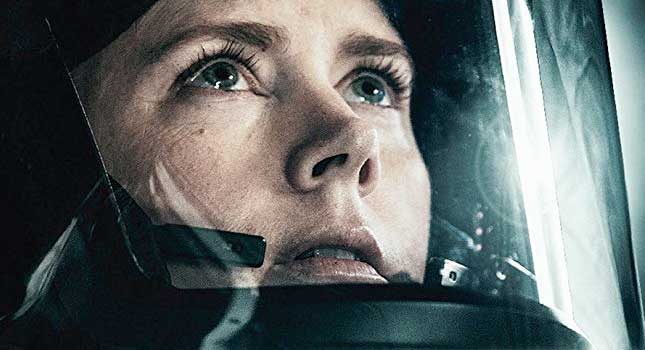
The story is powerful and moving, which aren’t really attributes we’re used to seeing in modern day sci-fi releases, but then this is a film that does things very differently. It surrounds the appearance of huge alien space ship structures around the earth without the faintest whiff of the usual attack strategy we’re used to seeing from visitors from outer space. If that isn’t enough of a thought provoking approach to take, it also focuses on the scientific efforts of a linguistics team trying to communicate with the heptapod aliens.
If you wanted to find fault, we’d say it only comes in retrospect as you mull over the full extent of what you’ve just watched. You could question the intervention that goes on to conclude the main plot for the film and ask why it didn’t come sooner, or get hung up on the inability of the aliens to communicate with us, despite their clear technological advancements. However, if you wanted to you could just about come up with a number of plausible explanations to account for them a little, and in all fairness the film itself throws in a couple of explanations along the way. You may also find yourself flip-flopping on the timeline development of the story, but this just adds to the interest in the film in the long run.
Amy Adams (Justice League) puts in a brilliant performance as linguistics professor Louise Banks as she’s brought into the US military’s team investigating the ship that has arrived in a field in Montana. She delivers an exceptional emotional range that draws you into the film and her character with ease. There’s literally only one scene in the entire film that we think could have been done a little more convincingly (for anyone interested, it’s when she’s playing tickle chase with her daughter, which doesn’t come across as being as genuine as it could), but for the most part she’s completely faultless for the entire 1-hour, 56-minutes of the dramatic first contact movie.
She’s got some strong support from the rest of the small cast with solid foundations being held in place by both Jeremy Renner (Captain America: Civil War) as theoretical physicist Ian Donnoly and Forest Whitaker (Rogue One) as Colonel Weber, who heads up to the team. Michael Stuhlbarg (Doctor Strange) is pretty effective as FBI Agent David Halpern and Tzi Ma (The Ladykillers) works well as head of Chinese military General Shang, but they’re both minor roles in an otherwise minimalist cast. It’s a method that you see more in theatre than on the big screen, but it helps to add to the intensity of the film and your connection with the main characters
Visually, Arrival is as close to perfection as it gets. The unique style of the ships, combined with the sheer scale of them creates an aura of awe inspiring silence. The special effects for the both the gravity transition on the space ship and the two aliens that we encounter, nicknamed Abbot and Costeloe by Ian and Louise, are equally heavy duty without being gratuitous in the slightest. There isn’t an ounce of SFX fat in the entire film with everything being created for a reason that is way beyond the concept of effects for effects sake. It’s a discipline that is often sadly missing in sci-fi films with the likes of Ghost In The Shell teetering over into overblown territory at times, rather than taking the more effective tightly wrought approach of films like this or Ex-Machina.
Director Denis Villeneuve (Blade Runner 2049) and director of photography Bradford Young (Han Solo film) have combined to deliver a movie that could well go on to be a seminal moment in science fiction history. You could say that there was Interstellar, Ex-Machina and The Martian before it, but it’s definitely up there with the best of cinematic science fiction in recent years.
This is definitely a film to add to your watch list if you haven’t already, but we’re not too sure how many times you’ll go on to watch it again, so Arrival might be more of a rental than a new addition to the DVD or Blu-ray collection. If you’re a big film buff and you want to watch a strong sci-fi story being delivered to near perfection then you might look at it differently. However, as a film it deserves nothing but a very positive review.
Arrival review: 4.5/5


